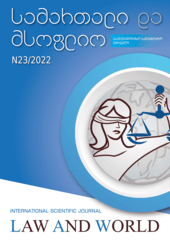The Problem of Using Imprisonment to Secure Bail in Criminal Proceedings 
##plugins.themes.bootstrap3.article.main##
Abstract
There is a provision in the criminal procedural legislation that creates a danger of covert violation of the basic human right – freedom. This threat arises at the first presentation session against the detained accused, when the court assigns the accused another, lighter, restraining measure instead of imprisonment. Despite the courts decision, the defendant is not immediately released from the courtroom. According to the Code of Criminal Procedure, at this time there is the use of imprisonment for the purpose of providing bail, i.e. "custodial bail". The courts decision to release the person on bail is enforced later, after the provision of the law has been fulfilled. In particular, the arrested accused is obliged to pay a certain amount of money as bail, in order to enforce the decision against him. As a result, the determining factor for the accuseds release is not the court decision, but his solvency. In case of non-payment of the amount, he remains in prison, which leads to an unjustified violation of the presumption of freedom. Making a decision on release by the court is of a formal nature, thus creating a practice of low protection of human freedom, incompatible with international standards. As a result of such an approach, the accused on bail is unjustifiably kept in prolonged detention and, moreover, he is deprived of the opportunity to appeal the said treatment.






